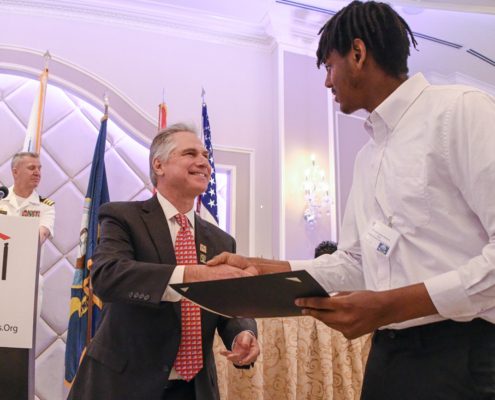By Cara Rinkoff, Managing Editor
Department of Veterans Affairs (VA) Secretary Denis McDonough delivered the keynote address during the opening ceremony of JWV’s 127th Annual National Convention in Savannah, Georgia. McDonough said he came to the convention to give an update on the latest work the VA is doing as well as to hear some of JWV’s concerns. “I’m here because these are true heroes, patriots, and people that I can learn a great deal from and that’s what we’ve done today,” McDonough said. “I’m thrilled to…make sure that we’re living up to not only the president’s command to me to fight like hell for vets but living up to the high expectations of the Jewish War Veterans, to make sure we’re doing right by them.”
McDonough spoke to JWV just two days before President Biden signed the PACT Act into law, which he called the biggest expansion of veteran benefits in history. The Secretary noted that this would not have happened without the hard work and advocacy of JWV.
He said the VA still needs JWV to pass along a few messages about the PACT Act to ensure all veterans get the care and benefits they’ve earned. “First, we at VA want veterans and survivors to apply for their PACT Act benefits right now. Second, we will begin processing the PACT Act benefits for veterans and survivors on the earliest date possible, which is January first. And third, any veteran or survivor can learn more about the PACT Act by visiting www.va.gov/PACT or calling 1-800-MY-VA-411,” McDonough said.
McDonough said another goal he hopes to tackle at the VA is ending veteran homelessness. “Our focus here is on two simple goals: getting vets into homes and preventing them from falling into homelessness in the first place.” McDonough said the VA is currently halfway to its target of finding permanent homes for 38,000 veterans this calendar year. McDonough also hopes to increase the housing supply, make existing housing more affordable for veterans, and then get vets any treatment they may need – for substance abuse or mental health issues – to ensure they can remain in their homes.
While the VA is doubling down on its telehealth capabilities, the Secretary said the department is also investing in infrastructure. “We’re going to modernize our facilities…because vets in the 21st century should not be forced to receive care in early 20th century buildings,” McDonough said. “Instead, we need to build a VA health care system with the right facilities, in the right places, to provide the right care for veterans in every part of the country.”
McDonough said suicide prevention is the top clinical priority of the VA.
The Secretary also talked about the expansion of the caregiver program, saying that in October, the program of comprehensive assistance will be available to every generation of veterans.
McDonough said, “VA don’t serve some vets. We serve all vets.” He said this means that female veterans will get the care they need, that all LGBTQ+ vets will get the service and support they need, and that racial disparities within the VA system will be eliminated. “In this administration no veteran is going to have to fight to get the quality care and benefits they’ve earned—no matter who they are, where they’re from, how they worship, or who they love.”
In short, McDonough used his speech to address the importance of the Jewish War Veterans to his department and veterans in general.
“The partnership between VA and JWV is all about working together to deliver for veterans,” McDonough said.
Volume 76. Number 3. 2022
 serve as an Army officer.
serve as an Army officer.
